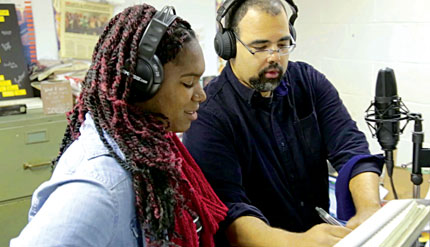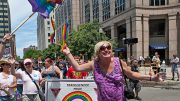
Nyla Rose (homeless youth) with David Coleman (musical arrangement) preparing to record “Invisible Butterfly,” a song written by Neil MacInnes-Barker for the documentary “No Place Like Home.”
Photo: Neil MacInnes-Barker, WIT•101 Productions
By: Lauren Walleser/TRT Assistant Editor—
CAMBRIDGE, Mass.—More than 200 people gathered at the Cambridge Public Library last month to listen to the stories of several homeless youth who identify as either lesbian, gay, bisexual, transgender, or queer and who are featured in a new documentary, No Place Like Home, about the struggles and survival of unaccompanied homeless youth living on the streets in Harvard Square.
“Young adult homelessness is both very complicated and very simple,” said Ayala Livny, program manager for Youth on Fire (YOF), a prevention program of AIDS Action Committee of Massachusetts that operates as a drop-in center for homeless youth in Harvard Square. “Very simply put, young folks are homeless for pretty much three main reasons: they’re homeless because home doesn’t exist, home isn’t safe, and home isn’t supportive.” [pullquote]Once on the street, LGBTQ youth are disproportionately likely to experience violence and victimization. They have difficulty finding shelters and are often discriminated against or attacked in adult shelters, which Livny and others referred to as a “meat market, where the strong prey on the weak.”[/pullquote]
According to Livny, between 20 and 40 percent of homeless youth on the national level identify as LGBTQ, as well as about 35 percent of the approximately 500 young people who are served by YOF each year. Once on the street, LGBTQ youth are disproportionately likely to experience violence and victimization. They have difficulty finding shelters and are often discriminated against or attacked in adult shelters, which Livny and others referred to as a “meat market, where the strong prey on the weak.” In order to find a warm place to sleep and a hot meal, some youth turn to prostitution or sleeping with older men who offer to put them up in exchange for sexual favors.
“We have young folks who don’t have options, and so they make decisions that aren’t necessarily in their best long term interests, because all they can do is prioritize what they need today,” said Livny.

Sean and Jade (homeless youth) huddle in the cold while gazing at the Massachusetts Statehouse.
Photo: John Consilvio, WIT•101 Productions
The event, “LGBTQ Young Adult Homelessness: Stories of Risk and Resilience,” was sponsored by the Cambridge GLBT Commission, the AIDS Action Committee of Massachusetts, and YOF as an opportunity for their members to share their experiences, challenge stereotypes and mobilize the community to work towards influencing public policy that will help fund more services for homeless youth.
YOF serves youth ages 14 to 24, regardless of their sexual orientation or gender identity, and provides services in the form of food, showers, laundry facilities, lockers, socks and underwear; support in the form of case managers; and opportunities for leadership, growth and development, including their speaker’s bureau. [pullquote]YOF serves youth ages 14 to 24, regardless of their sexual orientation or gender identity, and provides services in the form of food, showers, laundry facilities, lockers, socks and underwear; support in the form of case managers; and opportunities for leadership, growth and development, including their speaker’s bureau.[/pullquote]
“It is fundamentally a privilege to be let into the young people’s lives with whom we work, and it is an honor to be part of their change process,” Livny said. “We experience this work to be both a burden and a blessing. It is a blessing, again, to be invited into these young folks lives. It is a blessing to be part of their successes, and it is sometimes heartbreaking work. It is heartbreaking because the young folks that we work with experience heartbreaking things, and we are along with them for the ride.”
D McMillion, senior peer leader and nutrition coordinator at YOF, said she became homeless as age 16 after coming out to her very religious family. Living on the streets for nine years, McMillion said she survived with the help of three other individuals. Together, they would break into buildings and sleep in elevator shafts, Laundromats, and sometimes by the swamp in the Fens. Today, she is the only one of the foursome still living.
“I know what it means to survive on the street without anyone seeing you, without anyone loving you, without anyone being there to nurture you and uplift you, and I see where that gets people,” said McMillion. “I see how all my friends that I came up with are either dead or in jail or dying from HIV or AIDS. I see how everyone that I came up with is stuck in this endless spiral where they can’t do any better, they can’t get any better because there’s no help, and the reason why I do this is because I refuse to sit back and watch another young person go out like that.” [pullquote]Together, they would break into buildings and sleep in elevator shafts, Laundromats, and sometimes by the swamp in the Fens. Today, she is the only one of the foursome still living.[/pullquote]
Skyler, a 24-year-old member of YOF and self-proclaimed “traveler, gypsy, nomad,” became homeless after coming out to his parents as bisexual when he was 19.
“I hate and love myself at the same time,” said Skyler. “I honestly wish my family would do the same, but not all wishes come true. So in my mind, I just hang my head and lay myself back in the gutter.”
Skyler explained that the majority of shelters he has attempted to stay in are Christian-run, which often means they don’t allow gay people or are complicit with them being attacked by others in the shelter, if not outright rejecting them. He said his dream is to become a makeup artist, to find roommates and get a job. He shared that his father recently passed away before they were able to reconcile.
“I wasn’t able to sit down with him and explain to him that I’m still his son,” Skyler said. “He died hating me for being who I am, and I just want to let everyone know here, whether your son or daughter is queer or not, you should love them.”
Kelly Turley, director of legislative advocacy with the Massachusetts Coalition for the Homeless, spoke about how important it was for citizens to get involved in the public policy process by writing letters, meeting with legislators, and working to pass HB 135, an act providing housing and support services to unaccompanied homeless youth. [pullquote]Skyler explained that the majority of shelters he has attempted to stay in are Christian-run, which often means they don’t allow gay people or are complicit with them being attacked by others in the shelter, if not outright rejecting them.[/pullquote]
“This past year, the legislature signed into law legislation that created a commission on unaccompanied youth homelessness,” Turley shared. “We’re really grateful that there’s a state body that’s looking at youth homelessness seriously, in particular looking at the needs of LGBTQ youth, youth under 18 who aren’t of the age of majority and are in need of services and shouldn’t appropriately access resources through the adult shelters which [aren’t] developmentally targeted, emotionally targeted to their needs.”
HB 135 is a re-file of a bill filed last session, under which the commission was established, though the funding part of the bill has not yet passed. According to Turley, the funds would be used to create many kinds of housing resources for homeless youth, including long-term, permanent and emergency housing. Livny shared that as of now, there are only 12 beds total designated specifically for homeless youth in the state.
Later in the evening, Neil MacInnes-Barker introduced his new film (with WIT•101 Productions), No Place Like Home, which features YOF as an organization and highlights the stories of homeless youth living in Harvard Square. MacInnes-Barker said the experience of making the documentary was truly moving and thanked the youth for welcoming he and his crew into their lives. He also wrote a song, “Invisible Butterfly,” inspired by how many youth said they felt invisible.
During a Q&A after the film, the need for cultural competency among shelter workers was discussed, along with challenging the myths and misconceptions that homeless people are disease-ridden, lazy and have no drive.
“If you don’t have a home, it’s very hard to have a job, so that’s really what has to come first,” said Aren Stone, co-chair of the Cambridge GLBT Commission. “People have to have a home that they can then leave to go have a job, so their stuff is safe, so they’re safe, so they can have a safe place to come back to, and that was really eye-opening for me.”
Several members of the audience asked what they could do to help homeless youth feel more visible, even if they aren’t able to give money.
“When someone asks you for change, if you can’t spare it, just in a respectful way decline them,” said Nyla Rose, a member of YOF, who also provided the vocals for “Invisible Butterfly.” “Or, if they try to converse with you or joke with you, joke back with them, give them a little bit of your time, and you never know, you could make a big difference. You might make them crack a smile and that could make a big difference. They might be suicidal and you might change their mood.”
For more information on Youth on Fire and how to help, visit www.aac.org/yof. For more information on the Cambridge GLBT Commission, go to www.cambridgema.gov/glbt.aspx. To view a trailer for No Place Like Home, visit Youth on Fire’s Facebook page.








Many thanks to Lauren Walleser for an excellent article. She not only captured the event but also gave important information about youth homelessness. One very minor correction–according to library staff there were 200 people in attendance at the event. I only point this out to show how many people supported Youth On Fire and received an education about youth homelessness that night. Now that number will increase by all of the readers of The Rainbow Times.
Aren Stone